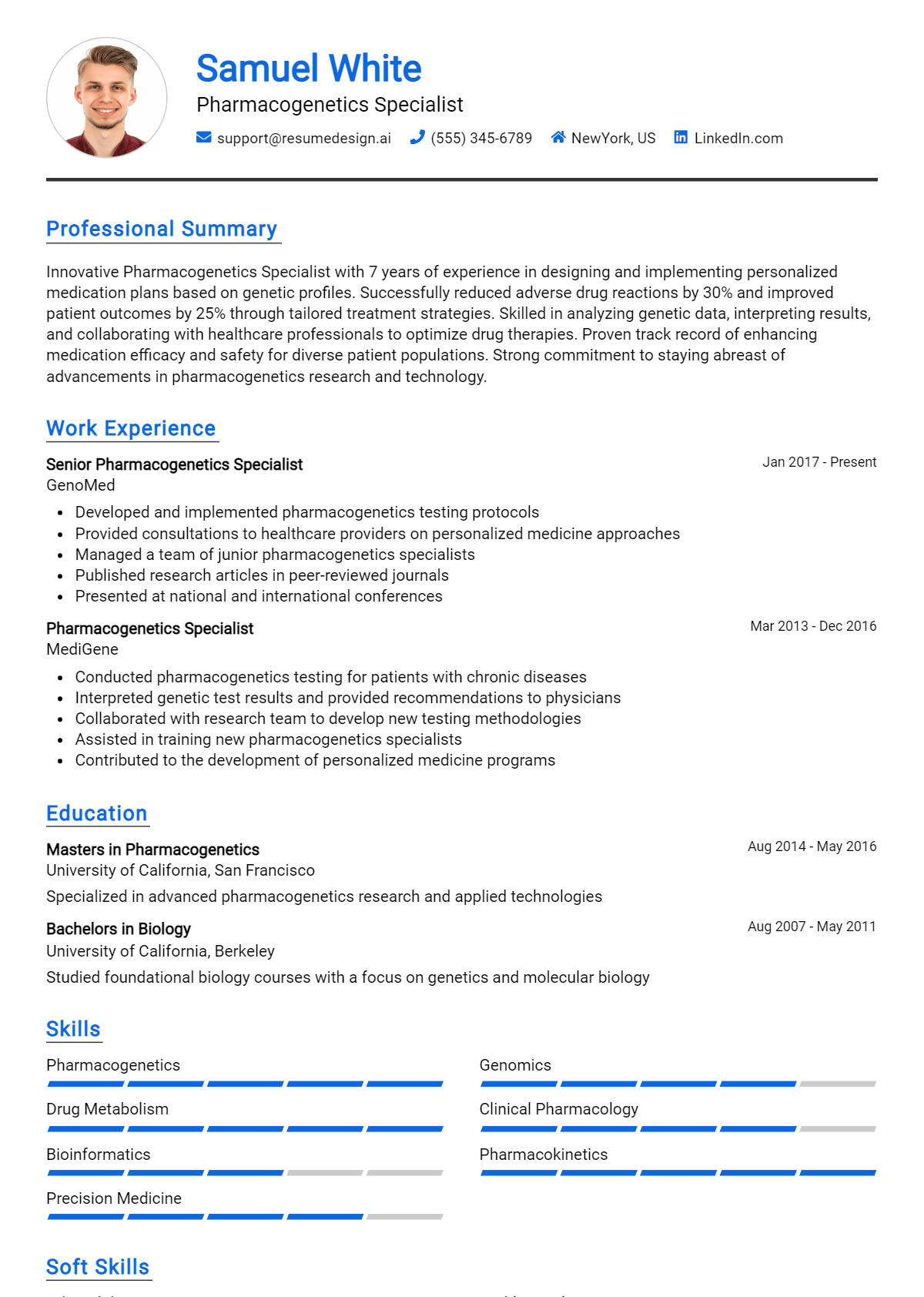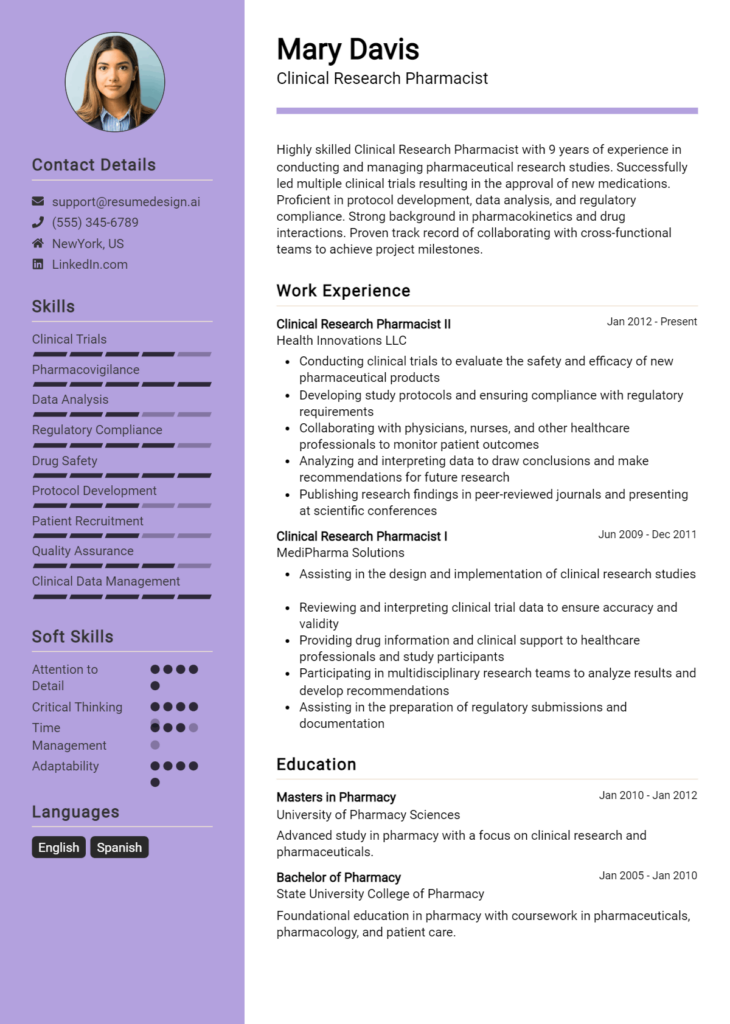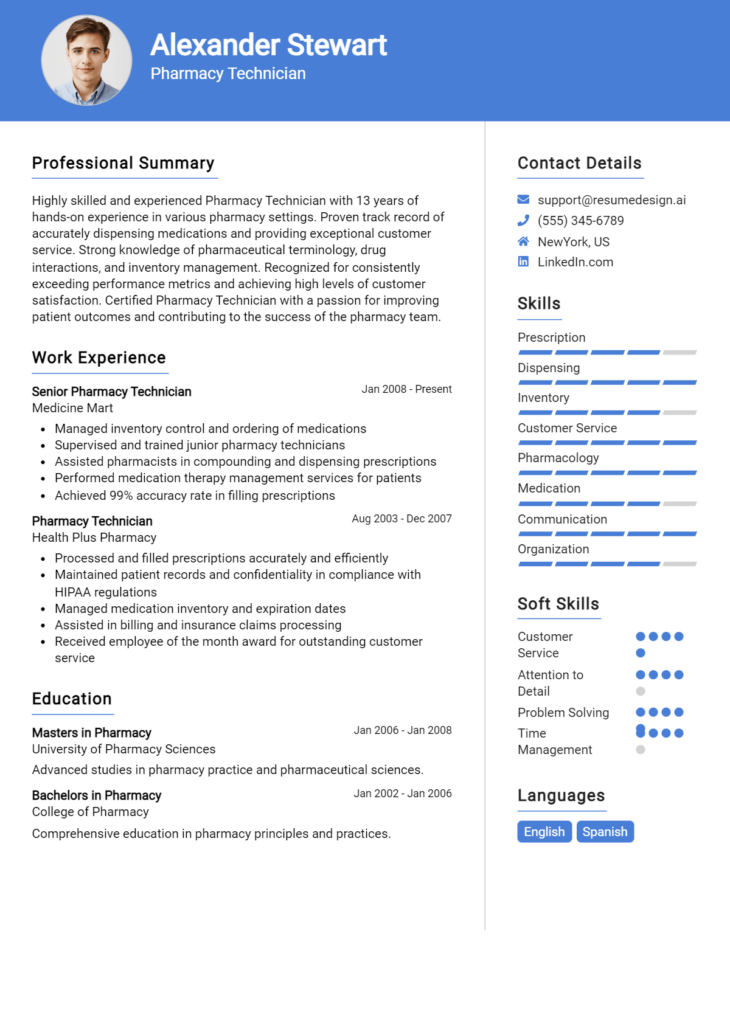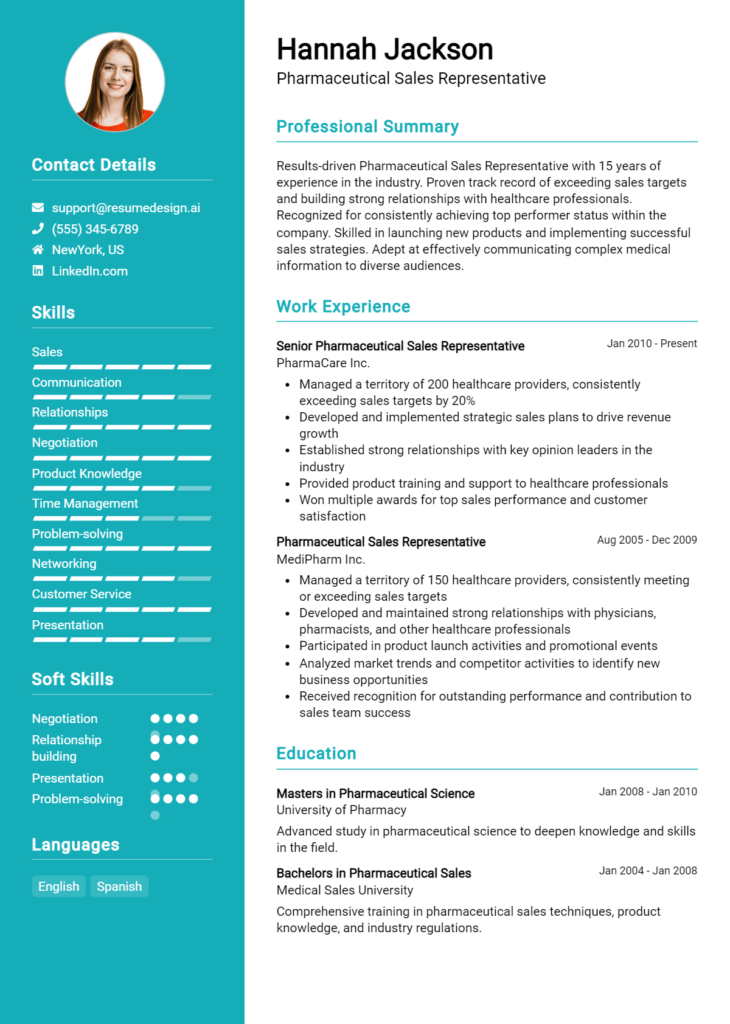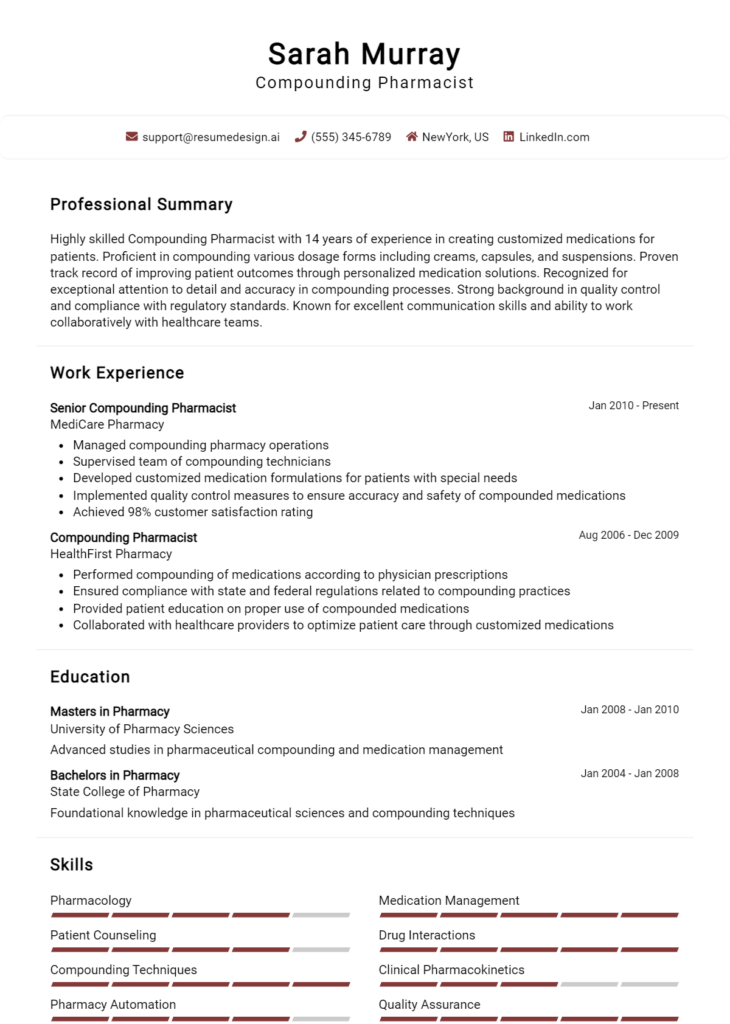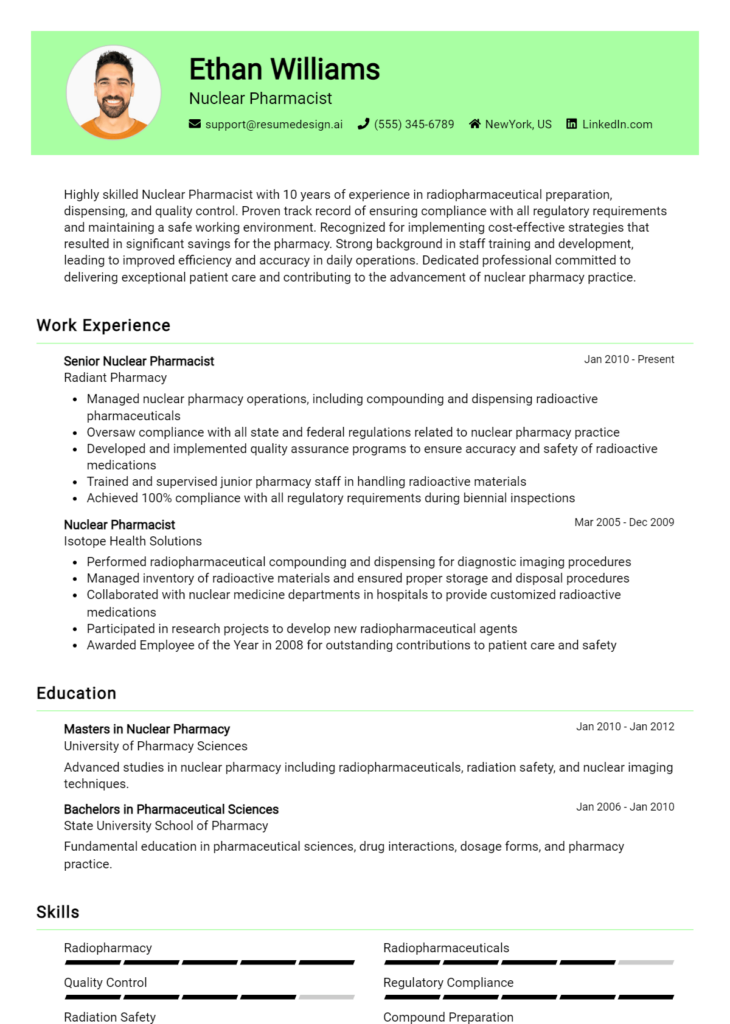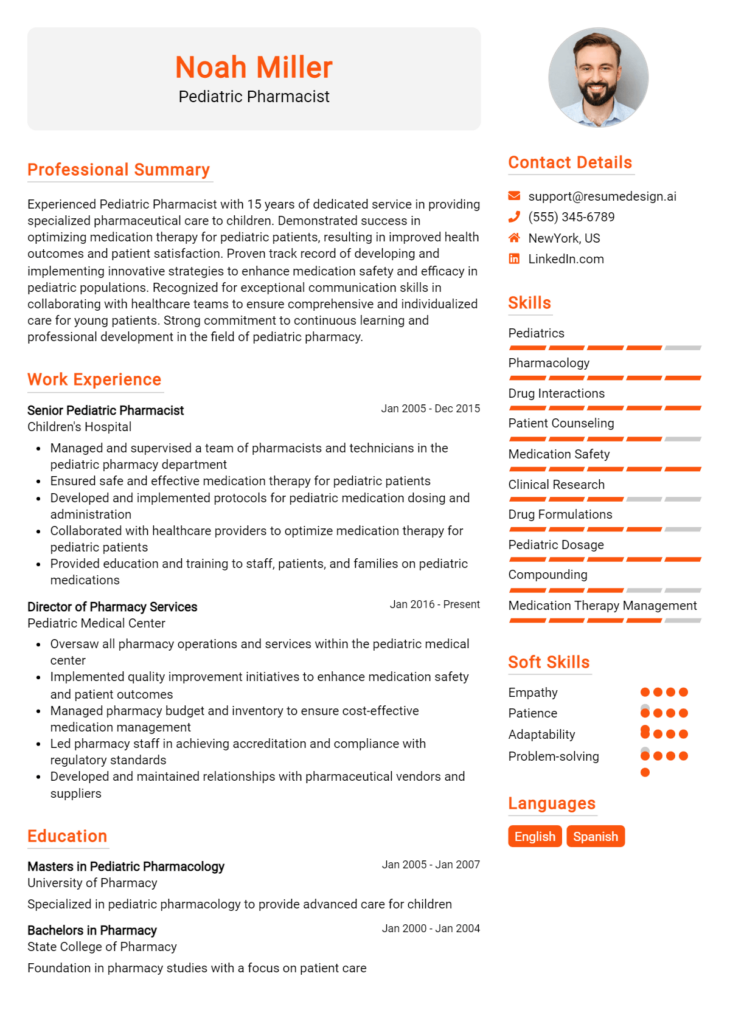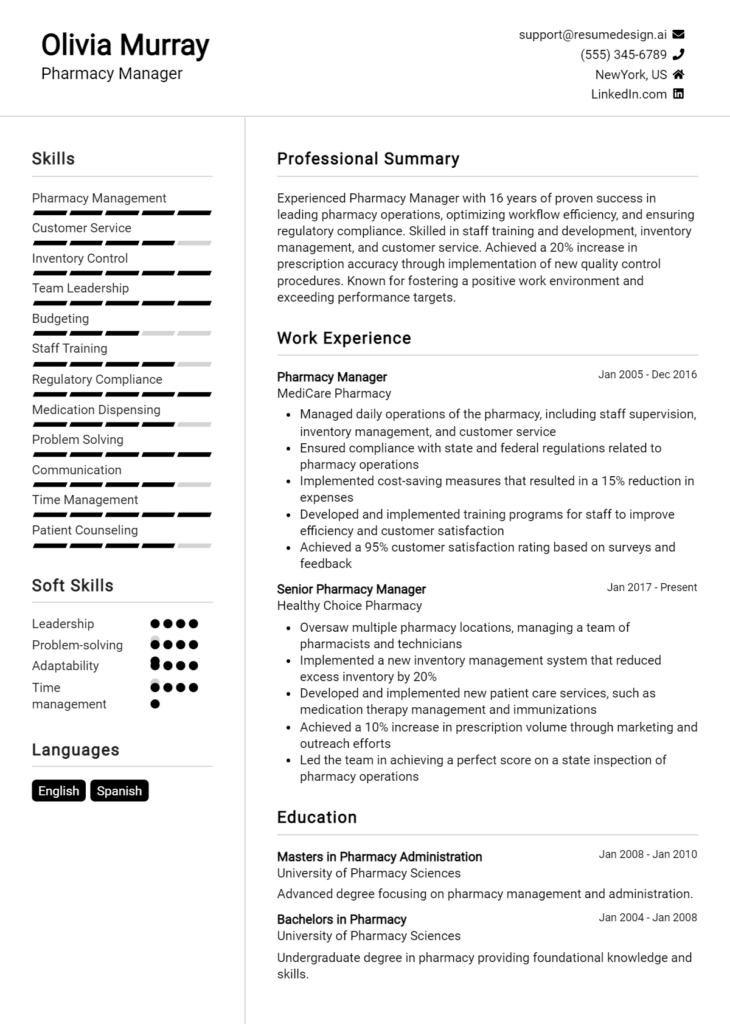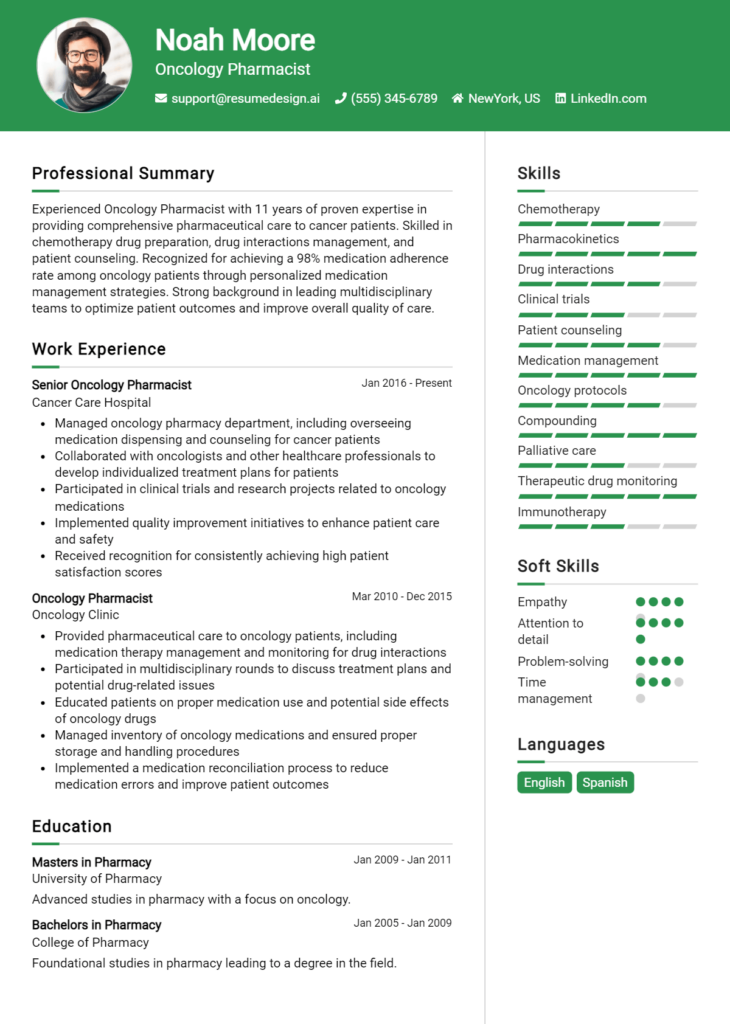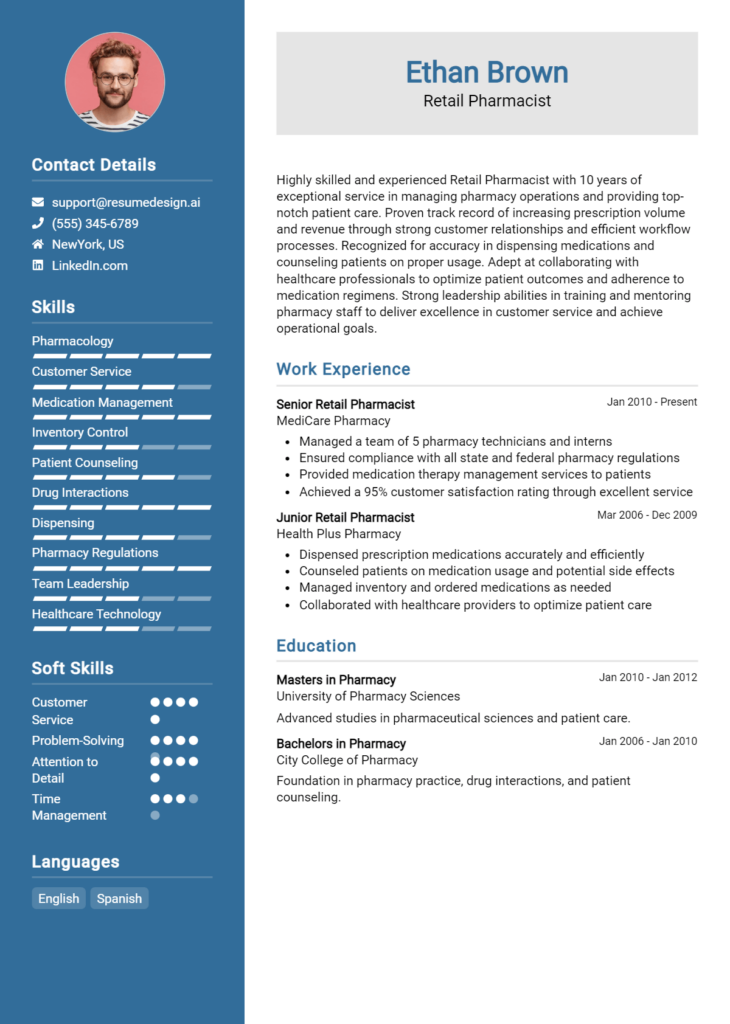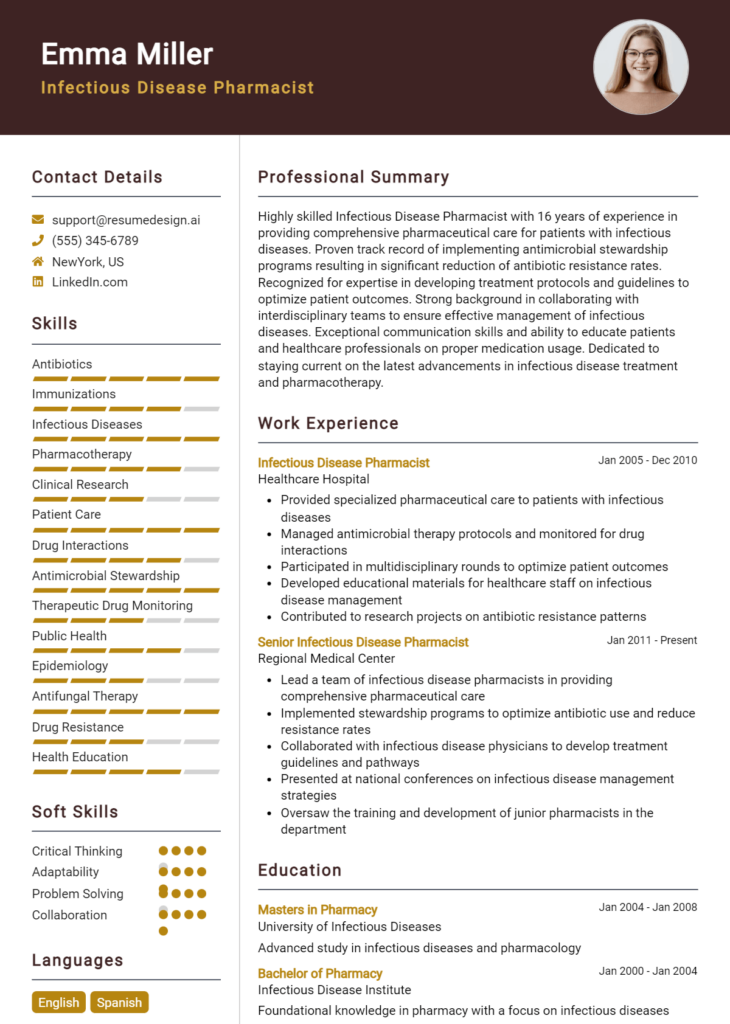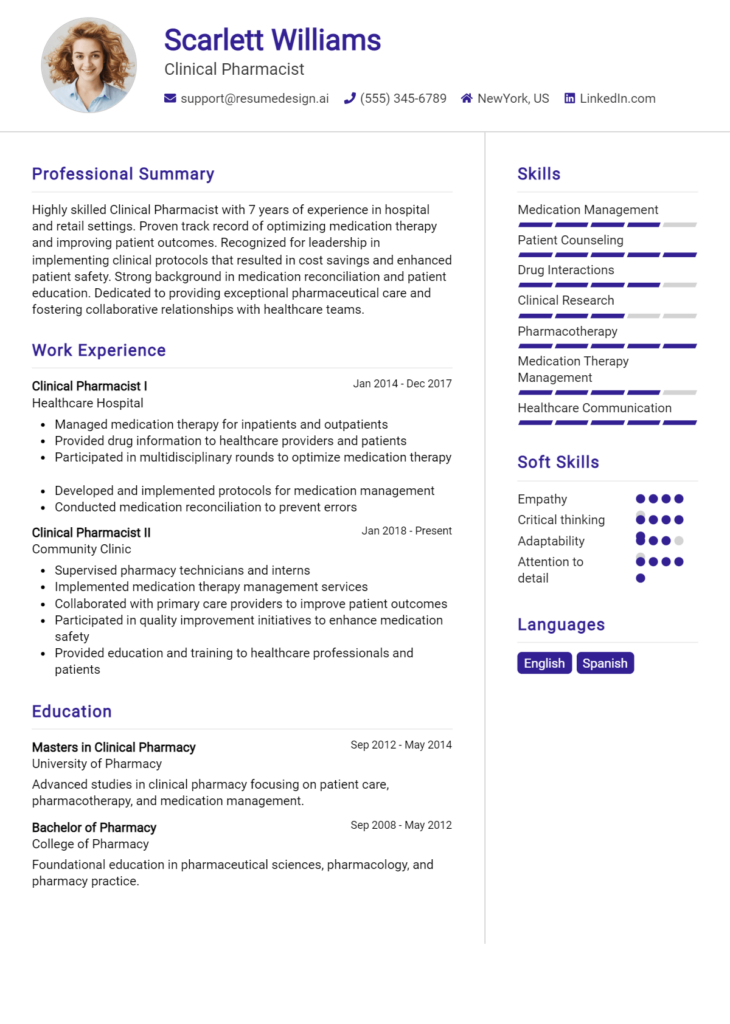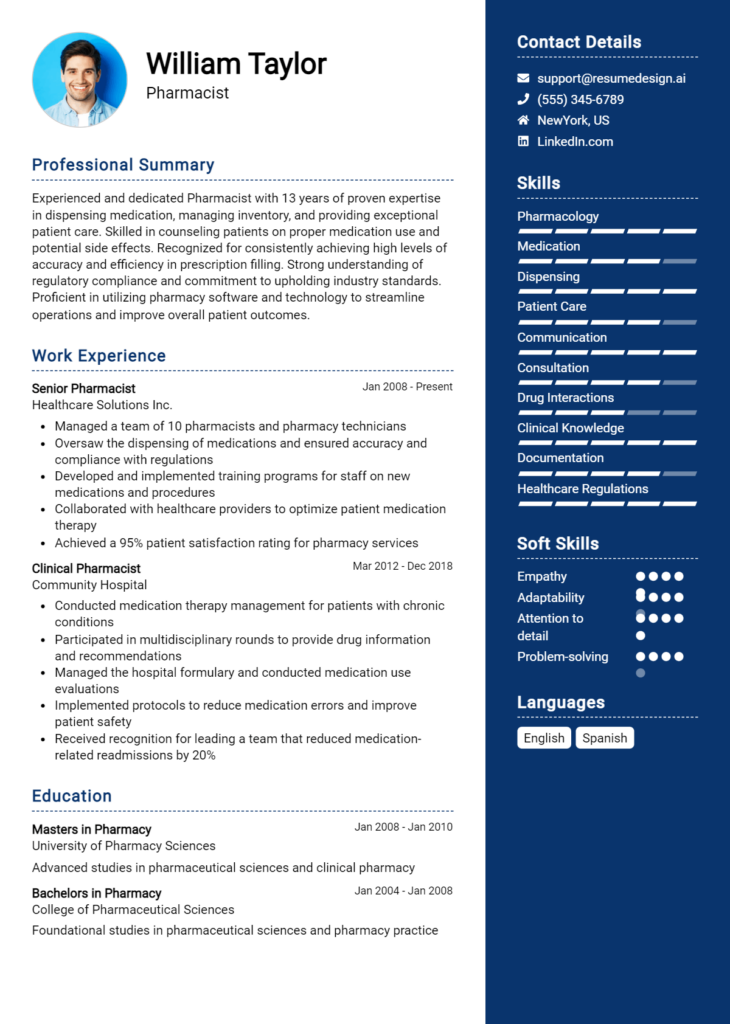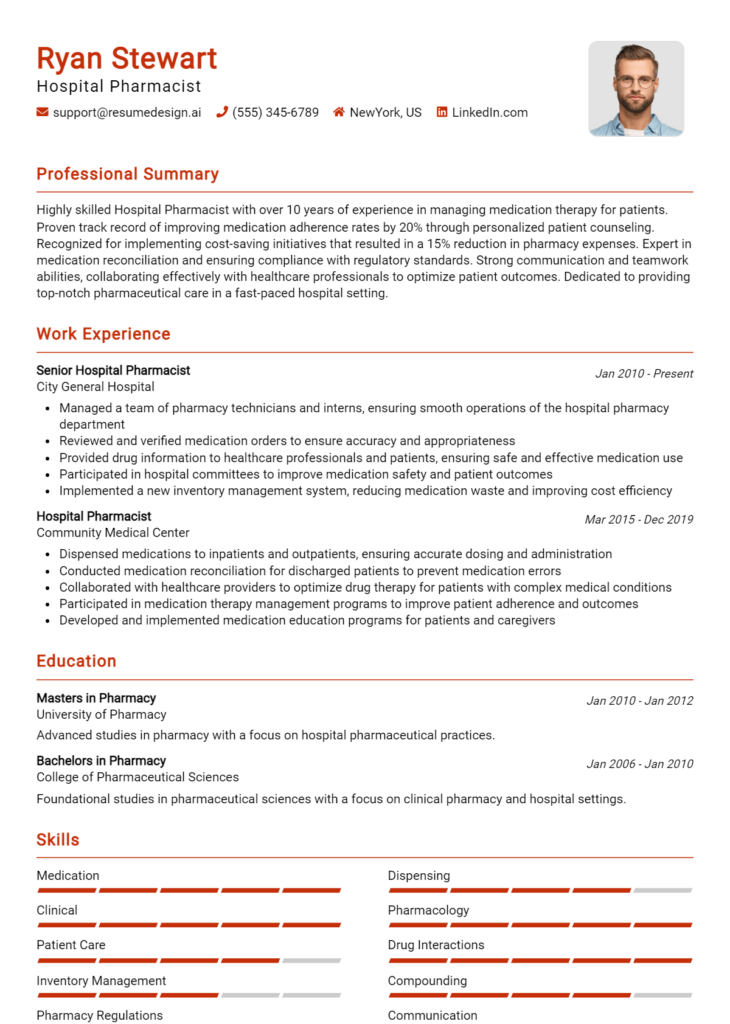Pharmacogenetics Specialist Core Responsibilities
A Pharmacogenetics Specialist plays a crucial role in bridging the gap between clinical practice and laboratory science by interpreting genetic data to guide medication therapy. Key responsibilities include conducting genetic testing, analyzing results, and collaborating with healthcare teams to tailor treatments based on individual genetic profiles. Essential skills include technical expertise in genetics, strong problem-solving abilities, and effective communication for interdisciplinary collaboration. A well-structured resume highlighting these qualifications is vital for showcasing how the specialist contributes to the organization's goals of personalized medicine and improved patient outcomes.
Common Responsibilities Listed on Pharmacogenetics Specialist Resume
- Conduct genetic testing and analysis for pharmacogenomic profiling.
- Interpret genetic data to inform clinical decision-making.
- Collaborate with physicians to develop personalized medication plans.
- Educate healthcare providers on pharmacogenetic implications.
- Stay updated on advancements in pharmacogenetics and genomics.
- Assist in research projects related to drug response and genetics.
- Provide genetic counseling to patients and families.
- Ensure compliance with regulatory standards in genetic testing.
- Develop and implement protocols for pharmacogenetic testing.
- Analyze and report data trends to improve patient care.
- Participate in interdisciplinary team meetings to discuss patient cases.
- Train and mentor junior staff in pharmacogenetic practices.
High-Level Resume Tips for Pharmacogenetics Specialist Professionals
In the competitive field of pharmacogenetics, a well-crafted resume is not just a document; it is your personal marketing tool that showcases your unique qualifications and expertise to potential employers. As the first impression you make, your resume must effectively reflect not only your technical skills but also your significant achievements in the domain of pharmacogenetics. A strong resume can open doors to new opportunities, setting you apart in a pool of qualified candidates. This guide will provide practical and actionable resume tips specifically tailored for Pharmacogenetics Specialist professionals to help you stand out.
Top Resume Tips for Pharmacogenetics Specialist Professionals
- Tailor your resume to match the specific job description, emphasizing the skills and experiences that align with the role.
- Include relevant certifications and training in pharmacogenetics, genetics, and related fields to demonstrate your qualifications.
- Showcase your experience with genetic testing technologies and bioinformatics tools that are pertinent to pharmacogenetics.
- Quantify your achievements where possible, using metrics such as improved patient outcomes or reduced medication errors.
- Highlight collaborative projects with healthcare professionals to demonstrate your ability to work in interdisciplinary teams.
- Incorporate industry-specific keywords to ensure your resume passes through Applicant Tracking Systems (ATS).
- Detail your experience with patient counseling and education regarding pharmacogenetic test results and implications.
- Emphasize any research contributions or publications in pharmacogenetics to showcase your thought leadership in the field.
- Keep the format clean and professional, ensuring readability and easy navigation for potential employers.
- Use a compelling summary statement at the top to capture the reader's attention and convey your career goals.
By implementing these tips, you can significantly enhance your resume and increase your chances of landing a job in the pharmacogenetics field. A polished and targeted resume will not only demonstrate your qualifications but also reflect your commitment to advancing in this vital area of healthcare, making you a more attractive candidate to potential employers.
Why Resume Headlines & Titles are Important for Pharmacogenetics Specialist
In the competitive field of pharmacogenetics, where precision and expertise are paramount, a well-crafted resume headline or title serves as a critical first impression for candidates. This concise statement not only grabs the attention of hiring managers but also succinctly summarizes a candidate's key qualifications in a single impactful phrase. A strong headline can highlight relevant skills, experience, and achievements, effectively setting the stage for the rest of the resume. It is essential that this headline be concise, relevant, and directly aligned with the job being applied for, ensuring that it resonates with the specific demands of the pharmacogenetics role.
Best Practices for Crafting Resume Headlines for Pharmacogenetics Specialist
- Keep it concise: Aim for a headline that is brief yet informative, ideally one sentence or a phrase.
- Be role-specific: Tailor your headline to reflect the specific position of Pharmacogenetics Specialist you are targeting.
- Highlight key qualifications: Include critical skills or achievements that align with the job description.
- Use strong action words: Begin with dynamic verbs that convey your expertise and impact.
- Include relevant keywords: Incorporate industry-specific terminology that matches the job posting.
- Avoid clichés: Steer clear of overused phrases that do not add value to your resume.
- Be authentic: Ensure your headline accurately represents your experience and capabilities.
- Update regularly: Revise your headline for each application to ensure it remains relevant to the role.
Example Resume Headlines for Pharmacogenetics Specialist
Strong Resume Headlines
"Certified Pharmacogenetics Specialist with 5+ Years in Precision Medicine Research"
“Results-Driven Pharmacogenetics Expert Specializing in Drug Response and Patient Care”
“Innovative Pharmacogenetics Specialist Committed to Advancing Personalized Treatment Plans”
Weak Resume Headlines
“Pharmacogenetics Professional Looking for Opportunities”
“Experienced in Genetics”
The strong headlines are effective because they clearly communicate specific qualifications and areas of expertise, making it easy for hiring managers to identify the candidate's value proposition at a glance. They utilize impactful language and are tailored to the pharmacogenetics field, establishing a connection with the job requirements. Conversely, the weak headlines fail to convey any concrete information about the candidate's skills or accomplishments, leaving hiring managers with a vague impression that does not differentiate the applicant from others. This lack of specificity and impact can significantly diminish the chances of standing out in a competitive job market.
Writing an Exceptional Pharmacogenetics Specialist Resume Summary
A well-crafted resume summary is crucial for a Pharmacogenetics Specialist, as it serves as a first impression for hiring managers. This brief yet powerful section quickly captures attention by summarizing key skills, relevant experience, and notable accomplishments tailored to the specific job role. A strong summary not only highlights the candidate's expertise in pharmacogenetics but also clearly demonstrates how their background aligns with the needs of the employer. It should be concise, impactful, and designed to entice the reader to delve deeper into the resume.
Best Practices for Writing a Pharmacogenetics Specialist Resume Summary
- Quantify achievements where possible to showcase the impact of your work.
- Focus on specific skills that are directly relevant to pharmacogenetics and the job description.
- Tailor your summary for each job application to align with the employer's needs and values.
- Use industry-specific terminology to demonstrate your expertise and familiarity with the field.
- Highlight any certifications, advanced degrees, or specialized training that enhance your qualifications.
- Keep it concise—aim for 3-5 sentences that deliver essential information without unnecessary detail.
- Showcase your ability to collaborate with multi-disciplinary teams to improve patient outcomes.
- Incorporate keywords from the job description to pass through Applicant Tracking Systems (ATS).
Example Pharmacogenetics Specialist Resume Summaries
Strong Resume Summaries
Dynamic Pharmacogenetics Specialist with over 5 years of experience in personalized medicine, having successfully implemented pharmacogenetic testing in clinical settings, resulting in a 30% increase in medication efficacy for patients with chronic conditions.
Detail-oriented geneticist specializing in pharmacogenomics, with a track record of analyzing over 1,000 patient samples, leading to the identification of actionable genetic markers that reduced adverse drug reactions by 25%.
Certified Pharmacogenetics Specialist with expertise in integrating genetic testing into treatment plans, enhancing patient care by tailoring therapies based on genetic profiles, which improved patient adherence rates by 40%.
Accomplished Pharmacogenetics Specialist with a PhD in Molecular Genetics, recognized for developing training programs that educated over 100 healthcare professionals on the significance of genetic variations in drug response.
Weak Resume Summaries
Experienced in pharmacogenetics and looking for a job in this field.
Pharmacogenetics Specialist with some experience in genetics and a desire to help patients.
The strong resume summaries are considered effective because they provide specific accomplishments, quantify results, and directly relate to the responsibilities of a Pharmacogenetics Specialist. They highlight significant contributions to patient care and the healthcare system, making the candidate stand out. In contrast, the weak summaries lack detail, are overly general, and fail to communicate the candidate's unique qualifications or achievements, making them less compelling to hiring managers.
Work Experience Section for Pharmacogenetics Specialist Resume
The work experience section of a Pharmacogenetics Specialist resume is crucial as it serves as a platform to demonstrate the candidate's technical skills, leadership abilities, and commitment to delivering high-quality outcomes. This section not only highlights relevant experiences but also provides an opportunity to quantify achievements, such as successful project completions and improvements in patient outcomes. Aligning work experiences with industry standards showcases the candidate's expertise and their ability to contribute effectively to a team, making them a valuable asset in the rapidly evolving field of pharmacogenetics.
Best Practices for Pharmacogenetics Specialist Work Experience
- Highlight specific technical skills relevant to pharmacogenetics, such as genotyping and data analysis.
- Quantify achievements using metrics, such as percentage improvements in patient response rates or reduced adverse drug reactions.
- Emphasize collaborative projects that involved cross-functional teams and stakeholders.
- Showcase leadership roles in managing projects, mentoring junior staff, or leading research initiatives.
- Include certifications or specialized training that demonstrate ongoing professional development in pharmacogenetics.
- Tailor experiences to align with the job description, using keywords that reflect industry standards.
- Utilize action verbs to convey initiative and impact in past roles.
- Provide context for each experience to illustrate the significance of your contributions to the overall project or organization.
Example Work Experiences for Pharmacogenetics Specialist
Strong Experiences
- Led a team of 5 in a pharmacogenomics project that increased patient medication efficacy by 30%, resulting in a 15% reduction in adverse drug reactions over one year.
- Developed and implemented a new genotyping protocol that improved turnaround time by 40%, enabling quicker clinical decision-making for over 200 patients annually.
- Collaborated with multidisciplinary teams to integrate pharmacogenetic testing into standard care protocols, enhancing personalized treatment plans for over 500 patients.
- Presented research findings at the National Pharmacogenetics Conference, contributing to the advancement of knowledge in the field and gaining recognition from industry leaders.
Weak Experiences
- Worked on various pharmacogenetics projects without specific details about outcomes or contributions.
- Involved in team meetings and discussions regarding pharmacogenetics topics.
- Assisted in the lab without mentioning specific techniques or results achieved.
- Participated in research activities without clarifying the impact of my involvement.
The strong experiences are considered effective because they clearly quantify the outcomes of the candidate's work, illustrate leadership and collaboration, and convey a direct impact on patient care and clinical practices. In contrast, the weak experiences lack specificity, measurable results, and do not demonstrate a clear contribution to the field of pharmacogenetics, making them less compelling to potential employers.
Education and Certifications Section for Pharmacogenetics Specialist Resume
The education and certifications section of a Pharmacogenetics Specialist resume is crucial as it serves as a testament to the candidate's academic qualifications and professional expertise. This section not only showcases the relevant degrees and certifications that align with the pharmacogenetics field but also highlights the candidate's commitment to continuous learning and staying updated with industry advancements. By providing detailed information on relevant coursework, specialized training, and industry-recognized credentials, candidates can significantly enhance their credibility and demonstrate their readiness to meet the demands of the role.
Best Practices for Pharmacogenetics Specialist Education and Certifications
- Include advanced degrees such as a Master's or Ph.D. in Pharmacogenomics, Genetics, or a related field.
- List industry-recognized certifications, such as Board Certification in Clinical Genetics or Pharmacogenomics.
- Provide relevant coursework that demonstrates a strong foundation in pharmacology, genomics, and bioinformatics.
- Highlight any specialized training programs or workshops attended that focus on pharmacogenetics.
- Use clear and concise language to describe educational achievements, avoiding jargon that may confuse hiring managers.
- Update this section regularly to reflect new certifications or courses completed to show ongoing professional development.
- When applicable, include honors or awards received during academic pursuits that relate to the field.
- Ensure that all information is presented in reverse chronological order, starting with the most recent qualifications.
Example Education and Certifications for Pharmacogenetics Specialist
Strong Examples
- M.S. in Pharmacogenomics, University of California, San Francisco, 2022
- Certified Clinical Pharmacogenetics Specialist (CCPS), American Society of Health-System Pharmacists, 2023
- Relevant Coursework: Advanced Pharmacology, Genetic Variability in Drug Response, Bioinformatics for Pharmacogenomics
- Training: Completed a specialized workshop on Genomic Medicine and Personalized Therapy, 2021
Weak Examples
- Bachelor's Degree in Business Administration, University of Texas, 2010
- Certification in Basic Life Support (BLS), 2018
- Relevant Coursework: Introduction to Psychology, Creative Writing
- Training: Attended a seminar on Office Management, 2020
The strong examples listed above are considered effective because they directly relate to the pharmacogenetics field, showcasing advanced degrees and certifications that validate the candidate's expertise. In contrast, the weak examples lack relevance to pharmacogenetics, featuring outdated or unrelated qualifications that do not support the candidate's suitability for the role, ultimately diminishing their credibility in the eyes of potential employers.
Top Skills & Keywords for Pharmacogenetics Specialist Resume
In the rapidly evolving field of pharmacogenetics, a specialized resume is crucial for highlighting the skills and expertise that define a successful Pharmacogenetics Specialist. The integration of both hard and soft skills is essential, as they work in tandem to ensure that a specialist can effectively interpret genetic data, communicate with patients and healthcare teams, and contribute to personalized medicine initiatives. A well-crafted resume that showcases these skills can significantly enhance job prospects and demonstrate the unique value a candidate brings to the table.
Top Hard & Soft Skills for Pharmacogenetics Specialist
Soft Skills
- Strong communication skills
- Empathy and patient-centered care
- Critical thinking and problem-solving abilities
- Attention to detail
- Team collaboration and interpersonal skills
- Adaptability and flexibility
- Time management and organizational skills
- Ethical judgment and integrity
- Continuous learning and curiosity
- Patient education and counseling capabilities
Hard Skills
- Proficiency in genetic testing technologies
- Knowledge of pharmacogenomic guidelines and literature
- Data analysis and interpretation
- Familiarity with electronic health records (EHR)
- Understanding of drug metabolism and pharmacokinetics
- Experience with laboratory techniques and assays
- Statistical analysis and bioinformatics
- Regulatory compliance and quality assurance
- Research methodology in genetic studies
- Project management skills in clinical settings
For more insights on how to effectively list skills and showcase your work experience, consider exploring the provided resources to enhance your resume further.
Stand Out with a Winning Pharmacogenetics Specialist Cover Letter
I am excited to apply for the Pharmacogenetics Specialist position, as advertised. With a robust background in pharmacogenomics and a passion for personalized medicine, I am eager to contribute to your team’s mission of optimizing patient care through advanced genetic insights. My academic training in genetics, coupled with hands-on experience in clinical settings, has equipped me with a deep understanding of how genetic variations can influence drug response and treatment outcomes.
In my previous role at [Previous Employer], I successfully implemented pharmacogenetic testing protocols that improved medication management for patients with complex health profiles. By collaborating closely with physicians and pharmacists, I provided valuable insights on drug-gene interactions, enabling tailored therapeutic approaches that enhanced patient safety and efficacy. My ability to communicate complex genetic information in an accessible manner has fostered a collaborative environment, ensuring that both healthcare providers and patients are informed and empowered in their treatment decisions.
I am particularly impressed by [Company Name]'s commitment to advancing precision medicine. I am eager to leverage my expertise in pharmacogenetics to support your initiatives in developing innovative testing solutions and integrating genetic data into clinical practice. I am adept at utilizing bioinformatics tools and staying current with the latest research in pharmacogenomics, which I believe will be invaluable in driving forward your strategic goals.
Thank you for considering my application. I look forward to the opportunity to discuss how my skills and experiences align with the needs of your team, and to contribute to the impactful work being done at [Company Name]. Together, I believe we can enhance patient outcomes and lead the way in personalized healthcare.
Common Mistakes to Avoid in a Pharmacogenetics Specialist Resume
When crafting a resume for a Pharmacogenetics Specialist position, it's crucial to present your qualifications and experience in the most effective way possible. However, many candidates make common mistakes that can hinder their chances of landing an interview. Avoiding these pitfalls can significantly enhance your resume's impact and help you stand out in a competitive field. Here are some common mistakes to steer clear of:
Generic Objective Statement: Using a one-size-fits-all objective statement can make your resume feel impersonal. Tailor it to reflect your specific interest in pharmacogenetics and how your skills align with the job.
Lack of Relevant Experience: Failing to highlight experience directly related to pharmacogenetics may lead hiring managers to overlook your application. Ensure that your relevant work, internships, or research projects are prominently featured.
Ignoring Keywords: Not incorporating keywords from the job description can hurt your chances of passing through Applicant Tracking Systems (ATS). Analyze the job listing and weave in relevant terms to demonstrate alignment with the role.
Overly Technical Language: While technical knowledge is essential in pharmacogenetics, using overly complex jargon can alienate readers. Strive for clarity and ensure that your resume is accessible to both technical and non-technical audiences.
Neglecting Soft Skills: Focusing solely on technical expertise without mentioning soft skills like communication, teamwork, and problem-solving can be a missed opportunity. Highlight how your interpersonal skills enhance your ability to collaborate in multidisciplinary teams.
Inconsistent Formatting: A resume with inconsistent formatting can appear unprofessional and difficult to read. Stick to a clear structure with uniform font sizes, bullet points, and spacing to create a polished look.
Failing to Quantify Achievements: Omitting numbers or outcomes in your achievements makes it harder to demonstrate your impact. Whenever possible, quantify your contributions, such as the number of patients managed or successful research projects completed.
Not Including Continuing Education: Pharmacogenetics is a rapidly evolving field, and not showcasing your commitment to ongoing education may signal a lack of engagement. Include relevant certifications, courses, or conferences to highlight your dedication to staying current in the field.
Conclusion
As a Pharmacogenetics Specialist, you play a crucial role in the intersection of pharmacology and genetics, helping to personalize medication plans for patients based on their genetic makeup. This article has highlighted the importance of understanding various genetic markers and their implications for drug metabolism, efficacy, and safety. We’ve also discussed the growing demand for specialists in this field due to the increasing recognition of personalized medicine in healthcare.
In conclusion, it’s essential to ensure that your resume effectively showcases your skills, experience, and knowledge in pharmacogenetics. Take the time to review and refine your Pharmacogenetics Specialist Resume to stand out in this competitive job market.
To assist you in this process, consider utilizing resources such as resume templates, which provide a solid foundation for your document. Explore our resume builder to create a professional resume tailored to your unique qualifications. You can also look at resume examples for inspiration and guidance on how to present your expertise effectively. Last but not least, don’t forget to craft a compelling cover letter using our cover letter templates to complement your resume and further enhance your application.
Take action today and ensure your resume reflects your qualifications as a Pharmacogenetics Specialist!

